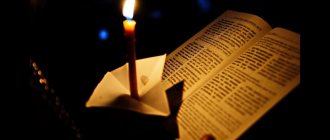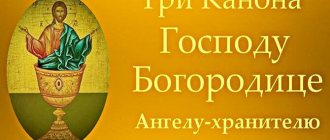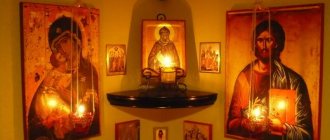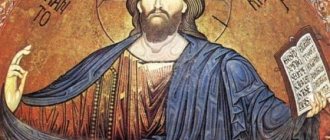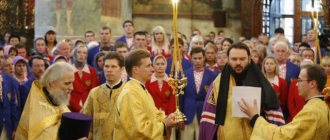Reading a prayer in the language in which it has been read for many centuries in a row returns a Christian to the origins of the true faith. Reading morning and evening prayers in Church Slavonic requires special concentration and attention. Leafing through the texts of ancient prayers every day, you begin to understand all the richness and wisdom of your native language.
Features of the prayer rule
A Christian who begins to read prayers will not immediately be able to get into the rhythm of prayer. Reading prayers in Church Slavonic requires skill and understanding of the text. A confessor can help with this. But without the sincere interest of the person praying, without his ardent faith, it is difficult to obtain spiritual grace from prayer. So that the soul does not crawl out of Orthodox life, so that sinful thoughts do not bother a person immediately after waking up and before going to bed, one should not forget about the prayer ritual.
By thoughtfully and leisurely reading prayers in the Old Church Slavonic language, we become familiar not only with the image of the Creator, but also understand our native culture and history.
Orthodox Life
Archpriest Vladimir Dolgikh explains why you need to read the “Our Father” prayer daily.
There is probably no more famous prayer in the world than the Lord's Prayer. For many, this is the first prayer that our grandmothers taught us, who carried the faith through the period of fighting against God. We are so accustomed to it that we even forget about the depth hidden behind simple and understandable words. The Lord's Prayer often “flies” past our minds and hearts, as something ordinary, as a habitual “prologue” to the prayers of others. But let's, at least a little, at least for a while, focus our attention on it.
The “Our Father” prayer in Old Church Slavonic is, perhaps, one of the few prayers that is completely understandable without translation, and this is one of its, let’s say, practical values. Our linguistic knowledge in this regard is quite meager; we can learn to read an “unintelligible” language, but in reality, none of us knows the language as languages are usually known. That is why it is easier for most people to understand the text in Old Church Slavonic in Russian letters. To acquire language comprehension skills, it is useful to listen to or read texts in Old Church Slavonic. In this regard, we are somewhat similar to our ancestors (although it was still simpler for them), and here’s why... Old Russian is the spoken language of all Slavs. From him, at different times, the so-called editions of Russian, Ukrainian, Belarusian, Bulgarian, Serbian and other Slavic languages originated. Yes, once upon a time the residents of Prague and the residents of Novgorod could understand each other without much difficulty. The Church Slavonic language we use today in worship is a later edition of the Old Church Slavonic language. Although it is related to Old Russian, the language is fundamentally different. The Old Church Slavonic language is precisely the language that arose among the southern Slavs thanks to the works of the disciples of St. equal to Cyril and Methodius, in particular, St. Kliment Ohridski. No one has ever spoken it; it has always been the language of church theological and liturgical writing.
In this regard, the text “Our Father” in Old Church Slavonic acquires special value, since it is a kind of “thread” connecting us with the culture and spirituality of our ancestors. The full text in Old Church Slavonic is not difficult to find, so you should not neglect the opportunity to refer to it, without missing out on such a seemingly insignificant nuance as reading the “Our Father” with emphasis.
There are a large number of interpretations for all seven petitions of the Lord’s Prayer, which are not possible to consider within the framework of a small publication, so we will limit ourselves to only general comments.
The prayer begins with words of appeal to our God the Father, and, as St. Maximus the Confessor, only a son (or daughter) can address himself in this way. We are such to God both by origin and by grace. The request for the coming of the Kingdom of the Lord and the implementation of His will is immediately followed by a request for the gift of daily bread. This is evidence of the unity of God and man, heavenly beings and earthly beings; this is evidence of the binding together of the material and spiritual components of our nature, the collapse of which is an unnatural tragedy that occurred as a result of the Fall. Also holy martyr. Cyprian of Carthage reminds us that the concept of “bread” can also be perceived in a supernatural sense, because Christ is the “bread of life” for us and, unlike ordinary bread, which can be the property of all people, He is only our “bread”, Christians .
Sin is not just some kind of legal violation of the law; it cannot in any way be limited to legal categories. Any commission of sin should be perceived by us as a falling away from God, separation from the Source, from the Bread of our life. Therefore, repentance is reconciliation with the Lord. Hence, the request to forgive debts is an act of reconciliation, and the condition for its fulfillment is our ability to forgive our own offenders. By reading the Lord's Prayer daily, we constantly remind ourselves of our own sinfulness, that we cannot live even a day without transgressions, and thereby eliminate complacency and conceit.
It is also important to say that from the mentioned tragedy of the separation of a person’s soul and body, a request for not being led into temptation and deliverance from the evil one harmoniously follows. Temptation - according to the apt remark of St. Maxima is the law of sin - i.e. is the very cause of the split in human nature, and the evil one is the source of temptation, the demon-seducer, whose only goal is the destruction of man through the aggravation of the split that has arisen. Also here we see that infernal forces, although they have their own activity, act in our lives exactly as much as the Lord allows them. Thus, God's Providence operates in all creation, including evil spirits. The Lord allows demons to approach us, we, in turn, showing volitional effort, seeking help from the Almighty, ask to deliver us from them, thereby cultivating our love for God and drawing closer to Him.
These small remarks are only a small fraction of those topics that can be taken from the Lord’s Prayer, therefore, reviewing the entire text of the prayer, one can and should perceive it not only as an appeal to God, but also reflect on it. Each of us has a time when we are walking in the park, riding in public transport, or simply somehow moving from point A to point B, and during this time we should not mindlessly look out the window or at our feet, but it is better to think about the topics eternal, which, in turn, will help distract you from sinful thoughts.
Prayer book in Old Church Slavonic
Orthodox monks know most prayers by heart; laypeople are forced to turn to the Prayer Book for help. Constant observance of the rules of morning and evening prayer helps to remember prayers, strengthens spiritual strength and faith. Prayers in Church Slavonic have a special sound power; they penetrate deeply into the soul of the believer, leaving an indelible mark on the heart.
Download morning prayers in Church Slavonic
Download evening prayers in Church Slavonic
Texts of prayers in Church Slavonic
In the name of the Father and the Son and the Holy Spirit. Amen.
Publican's Prayer
God, have mercy on me, a sinner. (Arch)
Initial prayer
Lord Jesus Christ, Son of God, prayers for your Most Holy Ones, Mother and all saints, have mercy on us. Amen. Glory to Thee, our God, glory to Thee.
Prayer to the Holy Spirit
Heavenly King, Comforter, Soul of truth, He who is everywhere and fulfills everything, Treasure of goodness and life, Giver, He came and dwelt in us, and cleansed us from all truth, and saved us, O God.
Trisagion Prayer
Holy God, Holy Strong, Holy Immortal, have mercy on us. (Read the sign of the cross three times and bow before it.) Glory to the Father, and the Son, and the Holy Spirit, now and always and unto ages of ages. Amen.
Prayer to the Most Holy Trinity
Holy Trinity, have mercy on us; Lord, cleanse our sins; Lord, forgive our iniquities; Holy One, visit and heal our infirmities in Your name.
Lord have mercy. (Three times).
Glory to the Father, and the Son, and the Holy Spirit, now and always and unto ages of ages. Amen.
Lord's Prayer
Our Father who art in heaven! Your name will be holy, your kingdom will come, your will will be as it is in heaven and on earth. Give us today our daily bread; and let us forgive our debts, just as we forgive our debtors; and lead us not into temptation, but deliver us from evil.
Prayer Creed
I believe in one God, Father, Almighty, Creator of heaven and earth, visible and invisible to all. And in the One Lord Jesus Christ, the Only Begotten Son of God, who was begotten of the Father before all ages; Light from Light, true God from true God, begotten, uncreated, consubstantial with the Father, everything was. We are for man and for our salvation, which came down from heaven and became incarnate through the work of the Holy Spirit and the Virgin Mary and became man. But he was crucified for us under Pontius Pilate, suffered and was buried. He rose again on the third day according to Scripture. And he ascended into heaven and sat down at the right hand of the Father. And to the flocks that come with the glory of judgment of the living and the dead, his kingdom will have no end. And in the Holy Spirit, the Lord, the life-giving one, who proceeds from the Father, who is worshiped together with the Father and the Son, and who is glorified by the prophets. In the Holy, Catholic and Apostolic Church. I confess baptism for the remission of sins. I accept the resurrection of the dead and the life of the age to come. Amen.
Diocese.info
Archpriest Andrei Tkachev discusses the meaning of the text and the importance of the Lord’s Prayer:
There is such a principle of life: learn to do what you already know how to do, and the unknown will be revealed to you. This also applies to the Lord’s Prayer, which we know very well:
The “Abridged Gospel” is what God-bearing people, God-bearing fathers call the prayer “Our Father.” Everything in it is simple, there is not a single theological term: father, heaven, name, kingdom, bread, debtor, temptation, evil one, amen... In this text the whole set of nouns is very unsophisticated, very simple and specific. At the same time, everything in it is about Christ, everything in it is about the Trinity, everything in it is about the sacraments of the church, everything in it is about eternal life.
It is curious that the Lord's Prayer is a prayer only for the earth. In the Kingdom of Heaven, if we happen to be there, if God is beyond merciful, as he is now beyond merciful to us... if we can enter where we must enter and will be there, we will also pray to God. We will not lie under the bushes and listen to fountains and streams gurgle, but we will pray. The Revelation of John the Evangelist describes the Kingdom of God as worship. There they sing “Hallelujah”, there they bow to the ground before the lamb, there they proclaim the eternal Gospel. That is, as it was revealed to John the Theologian, there is a service there, we will have to pray in heaven. And if we get tired of praying here, we are bored, tedious, uninteresting, then it is obvious: we will be bored, tedious and uninteresting in the Kingdom of God. At the same time, everything that is in the Lord’s Prayer today will be significantly reduced.
- For example, “Thy kingdom come...” Will it be necessary to ask Him in Paradise when the Kingdom of God comes and God is in everything, as Paul writes in his letter to the Corinthians? No, everything has already been accomplished...
- “Your will be done as it is in heaven and on earth...” - shall we ask? No, because that's all. Self-willed, self-willed people - they will be in another place, and those who are in Paradise will do the will of God. There is only one will in heaven—the will of the Father. It’s difficult to live here on earth, because everyone has their own will, their own desire, their own desire. These wills collide and this gives rise to human suffering. We all want different things, and if “your will,” then all this is down - we won’t ask for it in heaven.
- Shall we ask for bread? “Give us this day our daily bread?” “It’s unlikely, because a person who has achieved eternity will be abundantly satisfied with the flow of sweetness.”
- What about debtors? “Forgive our debts” - this will all end.
- “Do not lead us into temptation” - perhaps the Lord will leave this test for His faithful, in order to temper and educate them even more...
- But it certainly won’t be “deliver us from evil.” The evil one will be bound to the end, humble, and the smoke from the lake in which he will be tormented will rise into the sky forever and ever.
So, in essence, what will remain of the Lord’s Prayer in the Kingdom of Heaven?
“Our Father, who art in heaven. Hallowed be your name. Amen"
That is, in essence, we will praise and glorify God, we will no longer ask for anything. We will stand before him and rejoice with him. But besides this, we will look at each other, because great beauty is to see in front of you those who are better than you. For example, Isaiah, Jeremiah, Elijah, Moses, John the Baptist - all of them, not to mention the Mother of God, the apostles and Jesus Christ himself.
Today we looked at the “Our Father” prayer from such an unexpected angle. She is the queen of all prayers. Christ's lips were opened and this sweetness poured out from the mouth of the Lord. It is normative prayer. That is, there is invocation, and doxology, and petition, and thanksgiving. It is both short and succinct. Of course, every believer needs to know it by heart. The Gospel of Matthew, verses 9-12, is, in fact, the text of the Lord’s Prayer, the text of the Lord’s Prayer. It is beautifully sung, read, and can replace all prayers. Anyone who knows this prayer essentially knows everything. If he understood, imbued his heart with these meanings that are given to us in this sacred, brief and bottomless text:
Text of the prayer in Church Slavonic:
“Our Father” in modern Russian:
This is the full text of the prayer. You can end it simply with the word “Amen.” Often a doxology of the Holy Trinity is added at the end:
Or doxology:
Listen to “Our Father”:
Related posts:
- Evening prayers: for the future
- Prayer of repentance to Jesus Christ
- Saint Nicholas the Wonderworker
- Morning prayers
